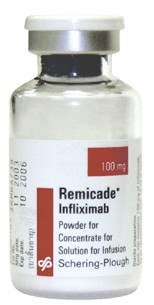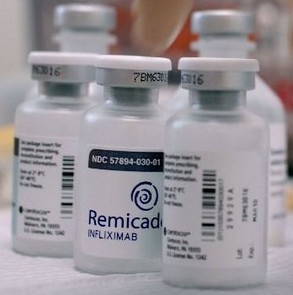|
9月23日,美国食品与药物管理局(FDA)批准英夫利西单抗(infliximab ,商品名:类克,Remicade)用于治疗对常规治疗反应不佳的6岁以上儿童的中度至严重活动性溃疡性结肠炎(UC)。 类克可减轻UC的症状和体征,并使病人维持临床缓解。UC是炎性肠病(IBD)的一种类型。UC的症状包括腹痛、腹泻、直肠出血、体重减轻和发热。在美国有5~10万儿童患IBD,其中40%为UC。 类克属于肿瘤坏死因子(TNF)阻滞剂类药物,TNF阻滞剂通过阻断TNF的活性抑制免疫系统。类克除了获准用于UC,还被批准用于治疗其他自身免疫性疾病,如成人和大于6岁儿童的克罗恩病,以及成人类风湿关节炎、强直性脊柱炎、银屑病关节炎和斑块状银屑病。 一项纳入60例有中至重度活动性UC的6~17岁少年儿童的多中心、随机、开放标签研究,支持类克的安全性和有效性。所有参试者均为用常规治疗失败或耐药者。 类克的加框警告提示有严重感染和癌症风险。包括结核感染和病毒、真菌或细菌感染的危险增加。青少年和年轻病人用TNF阻滞剂有少见癌症的病例报告,包括一种罕见和致命性癌症——肝脾T细胞淋巴瘤。 FDA告诫,所有儿童的疫苗接种都应在开始类克治疗前进行,在用类克期间不应接种活疫苗。类克最常见的副作用是UC恶化、上呼吸道感染、输液相关反应与头痛。 Remicade Generic Name: infliximab (Intravenous route) in-FLIX-i-mab Intravenous routePowder for Solution
Patients treated with infliximab are at increased risk for infections, some progressing to serious infections leading to hospitalization or death. These infections have included bacterial sepsis, tuberculosis, invasive fungal and other opportunistic infections. Evaluate for latent tuberculosis and treat if necessary prior to initiation of therapy. Lymphoma and other malignancies, some fatal, have been reported in pediatric patients treated with infliximab. Rare postmarketing cases of hepatosplenic T-cell lymphoma, usually fatal, have been reported in patients with Crohn's disease and ulcerative colitis treated with infliximab. All of these hepatosplenic T-cell lymphomas with infliximab have occurred in patients on concomitant treatment with azathioprine or 6-mercaptopurine . Commonly used brand name(s): In the U.S.
Available Dosage Forms:
Therapeutic Class: Immunological Agent Pharmacologic Class: Tumor Necrosis Factor Inhibitor Uses For RemicadeInfliximab is a monoclonal antibody. It is used to treat Crohn's disease in children (6 years of age and older) and adults who have not been helped by other medicines, and in adult patients who have a type of Crohn's disease where fistulas form. Infliximab is used to treat adults with rheumatoid arthritis and ankylosing spondylitis, which is a type of arthritis that affects the joints in the spine. It is used to treat adults with psoriatic arthritis, which is a type of arthritis that causes pain and swelling of the joints and patches of scaly skin on some areas of the body. Infliximab is also used to treat adults with ulcerative colitis and chronic severe plaque psoriasis, which is a skin disease with red patches and white scales that don't go away. This medicine is available only with your doctor's prescription. Before Using RemicadeIn deciding to use a medicine, the risks of taking the medicine must be weighed against the good it will do. This is a decision you and your doctor will make. For this medicine, the following should be considered: AllergiesTell your doctor if you have ever had any unusual or allergic reaction to this medicine or any other medicines. Also tell your health care professional if you have any other types of allergies, such as to foods, dyes, preservatives, or animals. For non-prescription products, read the label or package ingredients carefully. PediatricAppropriate studies performed to date have not demonstrated pediatric-specific problems that would limit the usefulness of infliximab for the treatment of Crohn's disease in children 6 years of age and older. However, safety and efficacy have not been established in children younger than 6 years of age. Appropriate studies have not been performed on the relationship of age to the effects of infliximab in children with ulcerative colitis and plaque psoriasis. Safety and efficacy have not been established. Appropriate studies performed to date have demonstrated that infliximab is not helpful in children with juvenile rheumatoid arthritis. Efficacy has not been established. GeriatricAppropriate studies performed to date have not demonstrated geriatric-specific problems that would limit the usefulness of infliximab in the elderly. However, elderly patients are more likely to have infections, which may require caution in patients receiving infliximab. Pregnancy
Breast FeedingThere are no adequate studies in women for determining infant risk when using this medication during breastfeeding. Weigh the potential benefits against the potential risks before taking this medication while breastfeeding. Interactions with MedicinesUsing this medicine with any of the following medicines is usually not recommended, but may be required in some cases. If both medicines are prescribed together, your doctor may change the dose or how often you use one or both of the medicines.
Interactions with Food/Tobacco/AlcoholCertain medicines should not be used at or around the time of eating food or eating certain types of food since interactions may occur. Using alcohol or tobacco with certain medicines may also cause interactions to occur. Discuss with your healthcare professional the use of your medicine with food, alcohol, or tobacco. Other Medical ProblemsThe presence of other medical problems may affect the use of this medicine. Make sure you tell your doctor if you have any other medical problems, especially:
Proper Use of RemicadeA nurse or other trained health professional will give you or your child this medicine. Infliximab is given through a needle that is placed in one of your veins. This medicine needs to be given slowly. The needle will need to remain in place for at least 2 hours. This medicine should come with a Medication Guide. Read and follow these instructions carefully. Ask your doctor if you have any questions. Precautions While Using RemicadeIt is important that your doctor check the progress of you or your child at regular visits to make sure that this medicine is working properly. Blood tests may be needed to check for unwanted effects. Your body's ability to fight infection may be reduced while you are using infliximab. It is very important that you call your doctor at the first sign of any infection. Check with your doctor right away if you or your child have any of the following symptoms while receiving this medicine: fever, chills, cough, flu-like symptoms, or unusual tiredness or weakness. Serious skin reactions can occur while you are using this medicine. Check with your doctor right away if you or your child have any of the following symptoms while receiving this medicine: blistering, peeling, or loosening of the skin; chills; cough; diarrhea; fever; itching; joint or muscle pain; red skin lesions; sore throat; sores, ulcers, or white spots in your mouth or lips; or unusual tiredness or weakness. This medicine may increase your chance of having a lupus-like syndrome or a liver disease called autoimmune hepatitis. Check with your doctor right away if you or your child have fever or chills; a general feeling of discomfort, illness, or weakness; joint pain; light-colored stools; nausea and vomiting; a rash on the cheeks or arms that is worse in the sun; upper right stomach pain; or yellow eyes and skin. A small number of people (including children and teenagers) who have used this medicine have developed certain types of cancer. This is more common in patients who have lung diseases (emphysema, COPD) or are heavy smokers, and in psoriasis patients who have had phototherapy treatment for a long time. Phototherapy treatment is ultraviolet light or sunlight combined with oral medicine to make your skin sensitive to light. Some teenagers and young adults with Crohn's disease or ulcerative colitis also developed a rare type of cancer called hepatosplenic T-cell lymphoma. Talk with your doctor if you have unusual bleeding, bruising, or weakness; swollen lymph nodes in the neck, underarms, or groin; or unexplained weight loss. Also, check with your doctor right away if your skin has red, scaly patches, or raised bumps that are filled with pus. While you are being treated with infliximab, do not have any immunizations (vaccines) without your doctor's approval. Live virus vaccines should not be given to patients who are using infliximab. Your child's vaccinations need to be current before he or she begins using infliximab. Be sure to ask your child's doctor if you have any questions about this. Check with your doctor right away if you or your child have any symptoms of liver problems, such as yellow skin or eyes, dark brown-colored urine, right-sided stomach pain, fever, or severe tiredness. You will need to have a skin test for tuberculosis before you start using this medicine. Tell your doctor if you or anyone in your home has ever had a positive reaction to a tuberculosis test. It is important to have your heart checked closely if you take infliximab. Call your doctor right away if you have shortness of breath, swelling in the ankles and feet, or a sudden weight gain. Do not take other medicines unless they have been discussed with your doctor. This includes anakinra (Kineret®) or etanercept (Enbrel®). Using these medicines together with infliximab may increase your chance of having serious side effects. Do not change or stop using this medicine without checking with your doctor first. Your doctor may want you to gradually reduce the amount you are using before stopping it completely. Remicade Side EffectsAlong with its needed effects, a medicine may cause some unwanted effects. Although not all of these side effects may occur, if they do occur they may need medical attention. Check with your doctor or nurse immediately if any of the following side effects occur: More common
Less common
Rare
Incidence not known
Other side effects not listed may also occur in some patients. If you notice any other effects, check with your healthcare professional. Call your doctor for medical advice about side effects. You may report side effects to the FDA at 1-800-FDA-1088. |
|
当前位置:药品说明书与价格首页 >> 综合药讯 >> 英夫利西单抗注射液(infliximab ,商品名:类克,Remicade)
英夫利西单抗注射液(infliximab ,商品名:类克,Remicade)简介:
9月23日,美国食品与药物管理局(FDA)批准英夫利西单抗(infliximab ,商品名:类克,Remicade)用于治疗对常规治疗反应不佳的6岁以上儿童的中度至严重活动性溃疡性结肠炎(UC)。
类克可减轻UC的症状 ... 责任编辑:admin |
最新文章更多推荐文章更多热点文章更多
|



